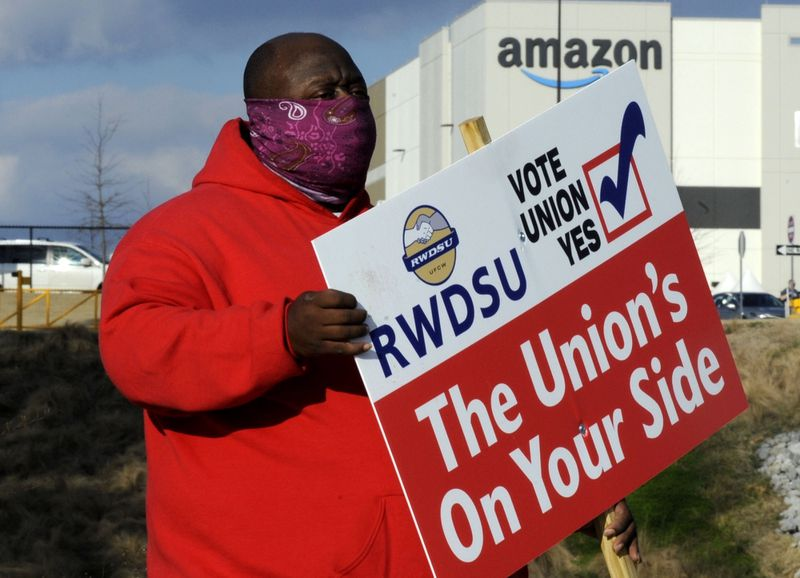Alliance for Retired Americans
|
Tell Congress: Pass the PRO Act So Workers Can Form a Union Without Barriers |
The U.S. House of Representatives will vote next week on the Protecting the Right to Organize (PRO) Act, which was introduced by Rep. Bobby Scott (VA) in the House and by Sen. Patty Murray (WA) in the U.S. Senate. |
|
Michael Foster of the Retail, Wholesale and Department Store Union holds a sign Feb. 9, 2021, outside an Amazon facility in Bessemer, Alabama, where labor is trying to organize workers. (Jay Reeves/AP) |
This momentous legislation will remove needless barriers that keep workers from forming a union and enable them to bargain for better wages, benefits, and safer workplaces.
Having the ability to join a union strengthens retirement security. |
Union workers earn more and can negotiate for benefits such as health care, pensions and employer contributions to retirement plans, which leads to higher income in retirement. Further, unions often come with negotiated defined benefit pensions, which provide lifelong retirement income.
"We urge all members of Congress to vote for the PRO Act,” said Robert Roach, Jr., President of the Alliance. “The labor movement has been, and continues to be, the leading force in the fight to strengthen Social Security, Medicare and Medicaid. That ensures a measure of retirement security for all Americans.”
Action Needed: Sign this petition asking Congress to vote YES on the PRO Act. |
House Passes Landmark Voting Rights Bill |
On Wednesday the U.S. House approved H.R. 1, a sweeping package of election and government reforms, to protect and expand voting rights. It will create a national system for automatic same-day voter registration, add transparency requirements for political advertising, and institute nonpartisan redistricting commissions to end partisan gerrymandering.
Nearly every Democrat voted for the bill, called the “For the People Act.” It also requires states to allow at least two weeks of early voting and to offer drop boxes for ballots — some of the measures that Republicans are currently trying to roll back in statehouses across the country.
“To say this legislation is necessary is a vast understatement,” said Richard Fiesta, Executive Director of the Alliance. “This last election saw millions of retirees vote by mail, an easy and secure way to exercise the right to vote. The Alliance went to court in 7 states to preserve that right. Now, more than 100 bills have been introduced in state legislatures to seriously undercut that right. It is time for the federal government to ensure that all voters’ rights are protected, no matter where they live or how they vote. The Senate must pass this legislation and send it to the President’s desk for signature quickly.” |
Leaked Documents Detail Postmaster General’s Plans to Slow Mail Delivery
|
The Washington Post published documents detailing Postmaster General Louis DeJoy’s new restructuring plan for the United States Postal Service (USPS) this week.
The plan dramatically changes the way the agency functions. Mailing industry officials now worry that it would further slow the nation’s mail service that delivers prescription drugs, bills, checks and other important documents. The plan would offer early retirement to tens of thousands of employees with at least 20 years of service, with no retirement incentives.
DeJoy, a former logistics executive and major Republican fundraiser, told the House Oversight and Reform Committee last week that he will roll out the rest of his restructuring plan for the Postal Service by the end of March. He told the panel that he is considering both longer delivery times and higher prices.
“Older Americans rely on the Postal Service, and these cuts in service would be devastating,” said Joseph Peters, Jr., Secretary-Treasurer of the Alliance. “As the White House said last week, the USPS needs new leadership. The Senate must quickly confirm President Biden’s three nominees to the Postal Service Board of Governors who have pledged to strengthen the Post Office, not dismantle it.”
|
Alliance Celebrates Women’s History Month |
This month marks the 35th annual recognition of the contribution women have made to political and social equality in our country. It is also a chance to reflect on how much remains to be done to ensure women have equal rights and opportunity in the United States.
Women make essential contributions to their communities and our economy, but their pay continues to lag, with women earning 81% compared to men performing the same job.
This Women’s History Month is occurring against a national debate to raise the federal minimum wage from $7.25 to $15 over five years. Raising the minimum wage would increase pay for 32 million workers across the country, according to an analysis from the Economic Policy Institute and the National Employment Law Project, and nearly 60% of those workers, or 19 million, are women.
“One way to honor the contributions women have made to our country is by ensuring that every woman is paid a living wage,” said President Roach. “A higher minimum wage also strengthens retirement security. A single worker who earns the current minimum wage her entire life and claims Social Security benefits in 2021 at her full retirement age would receive a monthly benefit of $980. With a lifetime income of $15 per hour, her monthly benefit would be $1,410.”
A higher minimum wage also would improve the solvency of the Social Security trust funds. |
KHN: Reopening of Long-Term Care Facilities Is ‘an Absolute Necessity for Our Well-Being’
By Judith Graham, Kaiser Health News |
For nearly a year, nursing homes and assisted living centers have been mostly closed to visitors. Now, it’s time for them to open back up and relieve residents of crushing isolation, according to a growing chorus of long-term care experts, caregivers, consumer groups and physicians.
They’re calling for federal health authorities to relax visitation restrictions in long-term care institutions, replacing guidance that’s been in place since September. And they want both federal and state authorities to grant special status to “essential caregivers” — family members or friends who provide critically important hands-on care — so they have the opportunity to tend to relatives in need.
|
|
Mary Daniel’s husband, Steve, has early-onset Alzheimer’s disease. Since visits to Steve’s assisted living facility in Jacksonville, Florida, were limited, Mary got a part-time job there so she could see him. (Lisa Marshall, Kaiser Health News)
|
Thanks for reading. Every day, we're fighting to lower prescription drug prices and protect retirees' earned benefits and health care. But we can't do it without your help. Please support our work by donating below. |





